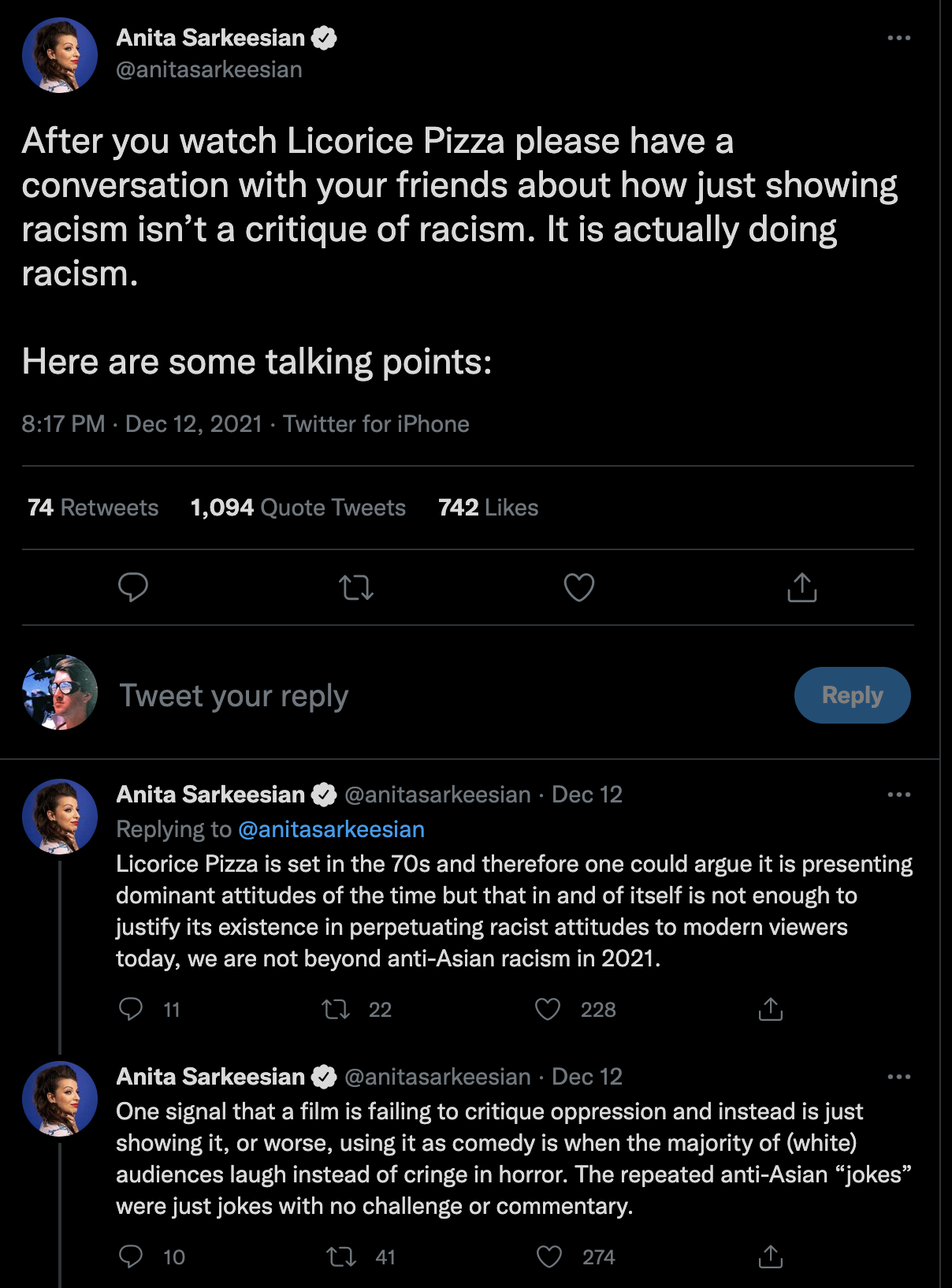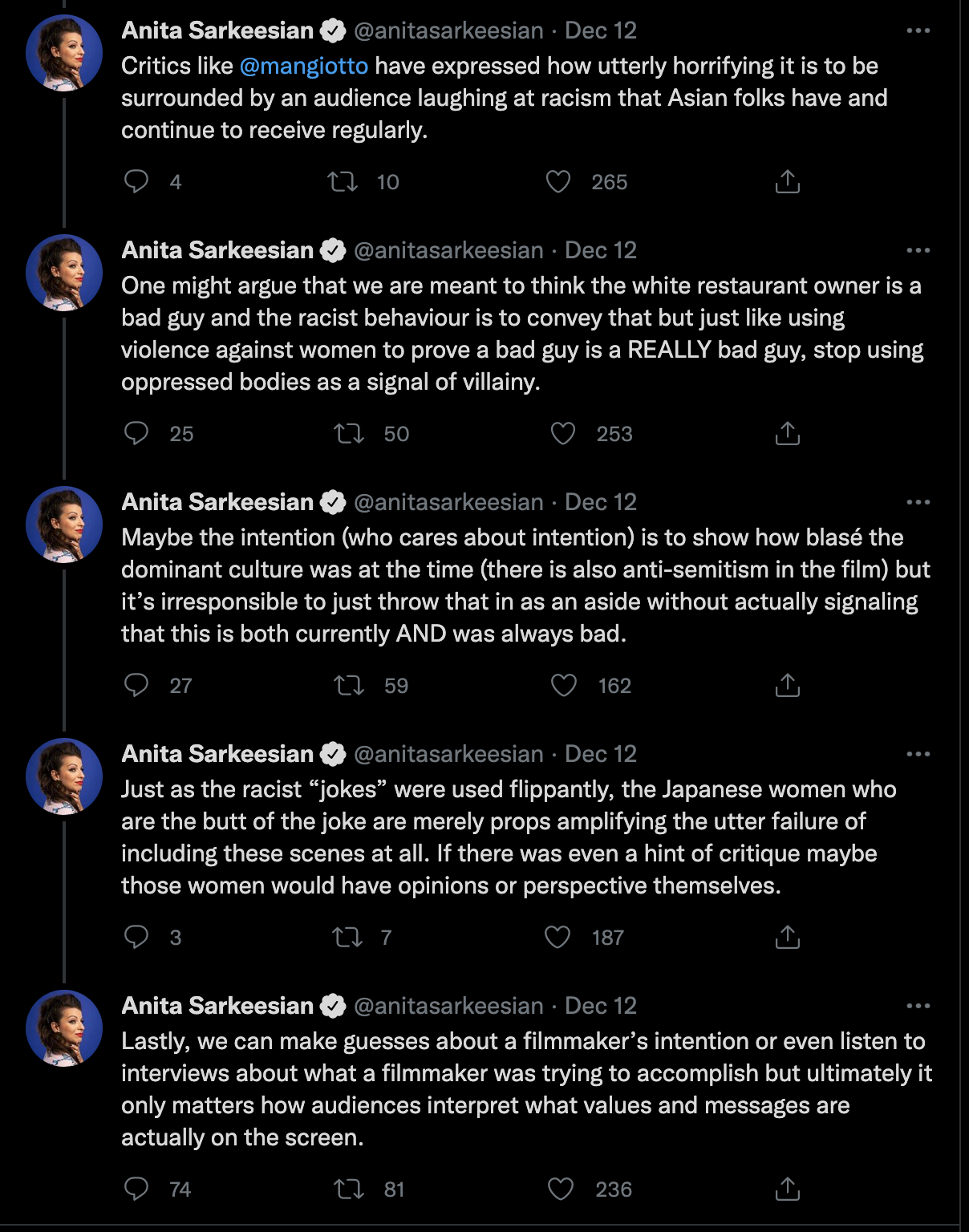Does a Licorice Pizza character's racism mean Paul Thomas Anderson is racist?
Anita Sarkeesian, who became well-known as someone kind of connected to the “GamerGate” nonsense a few years ago, is a feminist writer and thinker whom I respect. Her insights into female portrayals in video games are a timely and crucial social criticism. She strikes me as a fearless intellectual, and I love that. In a recent tweet thread, however, she made some claims about art that I find deeply troubling. Obviously, few care what troubles a cishet white man like me, and that’s somewhat understandable, if it’s legitimate to reduce me as a human to the biological categories to which I belong. This is why I have a blog almost no one reads, so that when I want to dig into an issue a little I am safely far outside of the conversation, since I am not wanted there. Licorice Pizza is the new film from writer-director Paul Thomas Anderson who is, admittedly, one of my cinematic heroes. So, here’s a take:
I cannot comment on the film—indeed, most of the country can’t yet comment on the film—because it’s not even out anywhere except New York and L.A. and I haven’t seen it. Apparently, a white character—the husband of one Asian woman and then later another Asian woman—mocks their way of speaking in a racist way a couple of times in the film. This, according to accounts, is played for laughs—although, that people might laugh is not evidence that it is “played” for laughs. There is a thing called irony, that might complicate the issue. Setting that aside.
Nothing wrong with a full-throated criticism of pretty much anything in any movie. Clearly, Sarkeesian feels the presentation of anti-Asian racism in the film, regardless of its period setting, is deeply problematic, and she has every right to express that opinion. It’s an interesting view and certainly one that we should consider, and particularly we should listen to those offended by this to better understand their points of view. (FYI, Sarkeesian has Iraqi-Armenian parents, though she was born in Canada—though, I don’t think this matters too much in terms of her response. She has every right to take up this argument, as does any thinker.)
But but but. This is an old saw—one of the oldest—that art must somehow make clear the “appropriate” political response to something portrayed in the work. I mean, everyone from the Greek tragedians on down—though we could go even older—have faced pressure to ensure their art presented the “correct” view, “correct” in the opinion of the moral guardians of the particular culture. Consider Oedipus. No moral relativism there—we cannot come away from that work (Rex, that is) with any ambivalence about the author’s view of Oedipus’s crime (Colonus, interestingly, is something of a different matter). Or, look at Shakespeare—Hamlet and Macbeth both had to die, for example, because they could simply not be allowed to get away with their crimes. (The Hays Production Code is another example of moral enforcement, of a type—filmmakers under the Code had to show the bad results of bad actions, or face censorship, potentially.)
I’m not trying to suggest, necessarily, that Sophocles and Shakespeare would grouse that they felt pressured to deliver a politically correct morality tale. They certainly knew that they had to do so to some extent—but, as far as I know, they may have been completely onboard with that project. It seems likely that they were, but I’d be interested to learn differently. (The filmmakers operating under Hays definitely groused.)
Art, literature, music—have developed considerably since Shakespeare’s day, and even over the last century have mutated beyond recognition from an older perspective. The Hays production code is long gone for Hollywood. Artists are under no legal or cultural obligation to tell positive stories or to refute bad behavior on the part of characters in their work—in the United States. Naturally, this is always an area of controversy. Historically, the critiques of “excessive” art have tended to come from the Right. But today these critiques are equally likely from either side of the aisle. Critique is one thing.
What Anita Sarkeesian seems to believe, however, strikes me as more than a critique. She says:
“Just showing racism isn’t a critique of racism. It is actually doing racism.” and
“[The argument about the historical time period] in and of itself is not enough to justify its existence in perpetuating racist attitudes to modern viewers today.” and
“[If audiences laugh at the racist behavior, that means the film has failed to] critique oppression…[by making an explicit] challenge or commentary.” (partially my restatement) and
“[It feels terrible to be Asian in a theater while this laughter is happening.]” and
“[Artists should] stop using oppressed bodies as a signal of villainy.” and
“It’s irresponsible to just [portray casual racism] without actually signaling that this is both currently AND was always bad.” (emphasis mine) and
“[The characters to whom the racism is directed in the film were one-dimensional and not given an opportunity to refute the racism in the film, even in a small way.]” (my re-statement) and
“[The author’s intention does not matter], it only matters how audiences interpret what values and messages are actually on the screen.”
Can I sum up?
Paul Thomas Anderson, or at minimum his film, is racist for depicting racism in the film without making it crystal clear that racism is wrong, now and at the time the film is set.
The thing that’s missing here is an argument. About which, okay, you can’t really make an argument on Twitter—no space. I’m not concerned just now about Twitter rhetoric being problematically unsupported by virtue of the type of platform it is. Everybody uses simplistic, unargued opinion statements on Twitter.
But what exactly would Sarkeesian propose? She’s not explicitly advocating for censorship. She’s simply calling an artist a racist for including a depiction of racism in his work. This rhetoric is often used to describe certain filmmakers (such as Quentin Tarantino). Broadly, those filmmakers tend to be cishet white men, but the charge could and likely is levied similarly against other artists of all types of identities, particularly within subcultures. The charge is By portraying a thing you are advocating for that thing.
I want to be even-handed here; I’d love to actually hear an argument, too. But the portrayal as advocacy thing just seems to me to be a category error—a fallacy, plain and simple. Sarkeesian is too smart to make such a fallacy. I have to assume she simply does not see it as fallacious—that she is engaging in a rewrite of the rules of logic as a way of doing social advocacy (or maybe it just pissed her off). What is she advocating for?
To be fair, she does not seem to be advocating for anything. But to follow out her comments to an action item of some sort anyway—does she believe that Paul Thomas Anderson should self-censor his own work to attempt to meet a kind of modern anti-racist standard? Does she believe artists, in general, must behave this way? Would she like to see something done about it, culturally?
Ibram X. Kendi, the author and thinker who brought the concept of anti-racism to the public consciousness, believes there should be a government Department of Anti-Racism (DOA) that would have some leverage over lawmakers. He says, “The DOA would be responsible for preclearing all local, state and federal public policies to ensure they won’t yield racial inequity, monitor those policies, investigate private racist policies when racial inequity surfaces, and monitor public officials for expressions of racist ideas. The DOA would be empowered with disciplinary tools to wield over and against policymakers and public officials who do not voluntarily change their racist policy and ideas.”
Would Sarkeesian like to see something similar for artists? The MPA rating system (G, PG, PG-13, R and NC-17) is technically voluntary—but, in practice, not at all voluntary for filmmakers who want their films to actually be released theatrically. Perhaps Sarkeesian would like to see casual racism added to the list of things that can determine a film’s rating? (It may de facto be the case already, I don’t know.) I presume that she does not want to see state censorship of artists—she’d just like artists to not do these things on their own.
But what she specifically wants (again, who knows what that is other than her, because she did not say) may not matter. To express some of the above—that artists must signal to audiences that racism is bad, for example—will without a doubt lead many to believe such dictums ought to be formalized. Many societies have used strict control over the arts as a method of social engineering, to direct citizens as to the “correct” behavior and beliefs—including our own society. Perhaps this could even be a positive thing, in terms of helping people form views that lead society in a better direction. Many leaders have tried to do things like this in human history.
Or maybe social pressure is enough—similar to the #MeToo movement.
Personally, I think it’s a recipe for mediocre, anodyne art—or worse, propaganda. It’s so easy to forget that such censorious thinking is non-political. That is, when we embrace this approach to art—that it must be wholesome, positive, politically correct—it becomes a tool of any and every political regime. No one should think that, by regulating art in this way, we would necessarily head in a good direction, even if that’s the intention.
When it comes to censorship and control, intention doesn’t matter either. There’s a famous Simpsons episode in which the smartest people in town—the local members of Mensa—take over the government. They feel this is best, because as the smartest people in town, they feel they will naturally make the best rules. It goes badly. It’s an old story—but you know, we never learn from the past.

